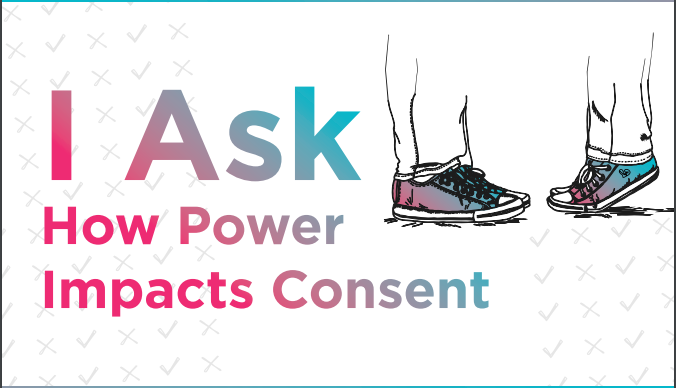Getting people to say “I Ask”
While April and this year’s Sexual Assault Awareness Month has passed, the work to end sexual and intimate partner violence is not over. In order to see lasting change, prevention and conversations about ending violence must continue well beyond the month of April. The theme for this year’s Sexual Assault Awareness Month was “I Ask,” which focuses on consent and contexts that impact consent, including examining how power influences consent. The goal of consent education should be to get people to say “I Ask,” and follow it with “I Respect” whatever answer is given to them.
Consent education seems simple, feels good, and is relatively non-controversial as a sexual violence prevention strategy. Consent education is written into policies and school curriculum, and is frequently talked about in national conversations. So why are people still not “getting it” when it comes to consent?

Not “getting it” stems from both the normalization of violence and violating boundaries and from the framing of consent education often lacking a perspective on power, privilege, and oppression. It’s difficult to identify consent when a society is so sexually unhealthy that examples and conversations about what good, safe, empowering sex looks and feels like are missing. It’s also difficult to identify consent in a society when, from birth to adulthood, people are told to accept the affections of strangers, relatives, and colleagues because they’re well-intentioned, despite the affection being unwanted. And consent in an inequitable society steeped in misogyny, white supremacy, homophobia, ableism, xenophobia, and countless other oppressions is no longer as simple as what the catch phrases imply, but instead requires examining and disrupting the power, privilege, and entitlement that allow for violence to occur. Getting people to say “I Ask” requires prevention strategies that disrupt systems of oppression to build a culture of equity.
Consent education should not be comfortable, but should be a direct challenge to the systems and beliefs that allow people to rationalize and justify assault and boundary violations. Centering anti-oppression in consent education cultivates discomfort among those with privileged identities. And it should. Progress comes from growth during discomfort, and people with privilege need to grow through that discomfort for the sake of everyone’s safety.
Disrupting power imbalances and oppression is core to preventing violence, with consent education continuing the conversation. The consent education conversations that emerge from this year’s Sexual Assault Awareness Month should serve as inspiration for a culture of consent and a reminder that in order to achieve that, anti-oppression must remain at the heart of violence prevention efforts. This strategy for prevention works, and not just for sexual and intimate partner violence prevention. Here are some resources to ignite conversations about power, privilege and consent:
- Resources from NSVRC for SAAM and I Ask, including materials on how power impacts consent
- Blog from the Indiana Coalition Against Domestic Violence “Taking an umbrella into a hurricane: why consent education should be step two in our work to eliminate sexual violence“
- Teen Vogue article “The Right Way to React is Someone Accuses You of Violating Their Consent“
- Web Conference recording for “Affirmative Consent Policies: Cultural Barriers and the Need for Affirmative Sexuality“
- Web Conference recording and guest profiles for “Centering the Margins: Advancing health equity for sexual and domestic violence prevention“
- Web conference recording and summary for “Mobilizing and Organizing Communities to End Child Sexual Abuse: Lessons Learned from the Just Beginnings Collaborative“
- Web conference recording and summary for “Shared Roots: Sexual and Domestic Violence Prevention Strategies in Support of Social Justice“
